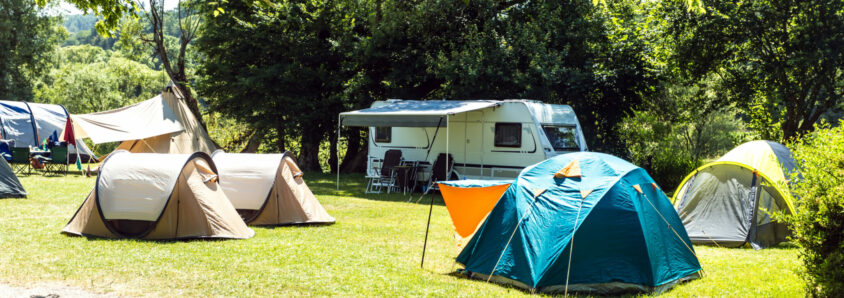Camping continues to grow in popularity, with over 7 million US households trying camping over the past few years. However, camping does come with many dangers that are important to know.
There are many benefits of camping, but there needs to be the right camping safety preparation, education, and insurance coverage. Otherwise, the dangers of camping can quickly turn an exciting trip into a nightmare. It is also essential to know the risks of owning a campsite in order to provide the right care for guests.
Here are the top dangers of camping and some camping safety tips.
1. Fire Hazards
When people think of camping, they often think about sitting around a fire, sharing songs, roasting marshmallows, and watching the stars. It sounds like the perfect evening, but many people do not know how to build a fire, leading to many fire risks.
If a camper does not build or start a fire correctly, it can spark out of control, threatening the campers, campsite, and nature. Campsite safety advice should include fire instructions and a clear statement about whether fires are permitted or not. If they are not allowed, there can be severe consequences for the people who started the fire.
2. Animals and Insects
The US has incredible camping spots to explore, but these untouched landscapes are not without wildlife. Here are the most common animal and insect dangers while camping:
- Bears
- Snakes
- Wolves
- Cougars
- Hornets
- Disease-carrying insects
- Scorpions
For the best safety with camping, it is important to know the animals that reside in the area. Then people can take steps to protect themselves and reduce the risk of an encounter. For example, people should shake their shoes and belongings before putting them on.
Mosquitos and ticks are common risks in parts of the US. Campsite safety should include campers inspecting themselves for ticks before bed and applying mosquito repellent.
There are a lot of bear safety camping tips out there, and with some simple steps, this danger is reduced significantly. However, many people do not take the right steps to bear-proof their campsite, such as keeping pets on a leash and managing food storage correctly. One of the best bear safety camping tips is keeping distance and making noise if someone spots a bear.
3. Extreme Weather Conditions
Weather can change quickly, no matter what the weather forecast says. Common weather hazards while camping include flooding, lightning, and snow. Campers can get caught out in these conditions, leading to injuries, being stranded, gear damage, and death.
Extreme heat or extreme cold are also some of the biggest risks while camping. Campers can develop conditions such as hypothermia or sunstroke. It is not uncommon for campers to not have suitable gear, leading to these conditions, even if temperatures are still mild.
For example, a camper may not have a warm enough sleeping bag or enough clothing to stay dry. Dehydration is also a risk if there are not enough water supplies or resources.
One of the risks of owning a campsite includes dealing with these medical emergencies, as often campers will spend a day exploring, then symptoms begin to appear once they arrive in camp.
It is essential to have the proper campsite safety protocols, as there is a liability risk when issues arise at camp.
4. Plants and Berries
It can be tempting to try different plants, especially when delicious berries appear on the trail. However, handing or consuming plants and berries without sufficient training can be dangerous.
Some berries and plants may be safe, but others could cause severe sickness. Some campers end up needing hospital attention or even poisoning themselves. Only those with the right training should share knowledge about plants and consume them.
5. Altitude Sickness
Some parts of the U.S. are at high altitudes, such as Colorado. Usually, any elevation over 8,000 feet can cause altitude sickness.
Altitude sickness causes a broad range of symptoms. It starts mild with headaches, nausea, loss of appetite, and fatigue. However, it can quickly escalate to vomiting and severe conditions, such as high-altitude cerebral edema (HACE) or high-altitude pulmonary edema (HAPE). These conditions can be life-threatening.
Campers should ascend slowly when at altitude. If someone experiences symptoms of altitude, action should be taken immediately. This can include descending to a lower altitude, rest, hydration, or seeking medical attention.
6. Falls, Injuries, and Medical Emergencies
Did you know that out of 78 deaths in national parks, 17% were to do with heart problems? It is common for people to exert themselves in ways they are not used to when camping and hiking.
Whether they have a pre-existing condition or not, campers can experience falls, injuries, and medical emergencies. People often fall when they are at viewpoints or go off-trail on a hiking route. Exhaustion is also a factor that can increase these risks of camping.
Common injuries include sprains, concussions, cuts, and broken bones. Drowning is also a risk in camping locations around water.
There are also risks if someone has substance abuse issues or struggles with their mental health. The right preparation must be in place to help people camp safely and enjoy their experience.
7. Giardia (Beaver Fever)
Giardia is a disease that is transmitted through contaminated water or poor sanitation. It is sometimes nicknamed beaver fever, and there are over 15,000 cases in the US per year. Most cases clear up on their own, but some people require medication.
It is also one of the main risks of owning a campsite, as there is a liability risk if water is contaminated on-site. Campsite safety needs to include water safety protocols.
Manage the Dangers of Camping
There are many risks of camping and risks of owning a campsite. But with the right preparation, camping safety tips, and insurance coverage, camping is an enjoyable activity with many benefits that outweigh the dangers of camping.
Are you an insurance producer that wants to provide your client with camping insurance? Camping insurance includes customized coverage and addresses specific risks of owning a campsite, such as liability insurance.
Prime Insurance Company writes innovative liability solutions for specialty risks, such as camping. With over 40 years of insurance, we can work with you to increase each other’s value.
Contact us today to learn more and get a quote.
___________________________________________________________________________________________
 Authored by Rick J. Lindsey, CEO, President, and Chairman of Prime Insurance Company
Authored by Rick J. Lindsey, CEO, President, and Chairman of Prime Insurance Company
Rick J. Lindsey hails from Salt Lake City, Utah. He began working in the mailroom of his father’s Salt Lake City insurance firm, getting his introduction to the business that became his lifelong career. Lindsey quickly rose through the ranks while working in nearly every imaginable insurance industry job. As an entrepreneur, specialty lines underwriter, claims specialist, risk manager, and a licensed surplus lines broker, Rick Lindsey is highly skilled in all levels of leadership and execution. As he progressed on his career path, Rick discovered an urgent need for insurers willing to write policies for high-risk individuals and businesses. He was frequently frustrated that he could not provide the liability protection these entities desperately needed to safeguard their assets. He also formed the belief that insurance companies acted too quickly to settle frivolous claims. Lindsey decided to try a different approach. He started an insurance company and became the newly formed entity’s CEO. This opportunity has enabled Rick to fill a void in the market and provide a valuable service to businesses, individuals, and insurance agents who write high-risk business. Prime Insurance also specializes in helping individuals and businesses who live a lifestyle or participate in activities that make them difficult for traditional carriers to insure. If you’ve been denied, non-renewed, or canceled coverage, don’t give up quite yet. Chances are Prime Insurance can help.


